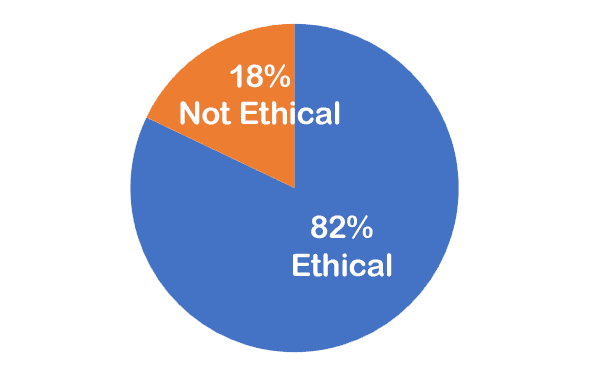This is the May 2022 edition of our monthly series of Ethics case studies titled What Do You Think? This series is comprised of case studies from NSPE archives, involving both real and hypothetical matters submitted by engineers, public officials and members of the public.
Your peers and the NSPE Board of Ethical Review have reviewed the facts of the case as shown below. And, here are the results.
Your opinion has been registered for the May 2022 edition of our monthly series of Ethics case studies titled What Do You Think?
Your vote is recorded as:

Want to know how your peers voted? We’ll send you an email with the poll results on May 24.
Your opinion has been registered for the May 2022 edition of our monthly series of Ethics case studies titled What Do You Think?
Your vote is recorded as:

Want to know how your peers voted? We’ll send you an email with the poll results on May 24.
A Review of the Facts
A large utility is looking for a design/build or turnkey approach for its new project. In order for Engineer Andrew to compete on this project, he is required to establish partnerships with manufacturing and construction contracting firms. Each partner is responsible for its own expenses in preparing the proposal.
Andrew is requested to make a proposal to the utility on behalf of the partnership. The agency requires that preliminary engineering be done at the proposal stage. Andrew was required to prepare a series of simple layouts so that the contractor could estimate its part of the project. Each of the partners had a significant investment in time, which each partner covered with the understanding that if the partnership receives the project, each partner will recover its costs.
Andrew is concerned that this type of partnering arrangement may involve contingencies under which his professional judgment may be compromised.
Is it ethical for Andrew to engage in a partnership of this type?
Here is the result of our survey of your peers:

Applicable NSPE Code References:
Code I.5
Engineers, in the fulfillment of their professional duties, shall: Avoid deceptive acts in the solicitation of professional employment.
Code II.1.d
Engineers shall not permit the use of their name or associate in business ventures with any person or firm that they believe is engaged in fraudulent or dishonest enterprise.
Code II.2.a
Engineers shall undertake assignments only when qualified by education or experience in the specific technical fields involved.
Code II.4.a
Engineers shall disclose all known or potential conflicts of interest that could influence or appear to influence their judgment or the quality of their services.
Code II.4.b
Engineers shall not accept compensation, financial or otherwise, from more than one party for services on the same project, or for services pertaining to the same project, unless the circumstances are fully disclosed and agreed to by all interested parties.
Code III.5
Engineers shall not be influenced in their professional duties by conflicting interests.
Code III.6.a
Engineers shall not request, propose, or accept a commission on a contingent basis under circumstances in which their judgment may be compromised.
Discussion
The facts of this case describe a construction process commonly known as “design/build and/or turnkey.” This construction process has been used by industry for many years and is becoming more commonly used in governmental work. This is an accepted approach to construction by both the business community and the profession. Therefore, this approach described by the facts raises no business concerns, and the issues turn solely on ethical considerations.
The Board expressed the opinion in Case 65-5 that it is ethically permissible for an engineering firm to submit a combined bid for design and construction services, provided that the combined bid did not include a separate price proposal for the engineering services alone. Case 76-9 considered participation of an engineer with a contractor either by joint venture or through a contractor-subcontractor relationship. In this case, the Board found either approach would be ethically acceptable. Andrew preparing the proposal does not create an ethical concern.
The Board notes that the NSPE Board of Directors adopted a policy in 1965, which recognizes that design/construct or turnkey is an established and acceptable practice provided that engineering services are performed under the direction of a registered professional engineer.
Since NSPE has adopted a policy acknowledging the acceptability of this type of construction process, and this has been confirmed by prior BER cases, Andrew complies with the Preamble requiring the adherence to the principles of ethical conduct on behalf of the public, clients, employers, and the profession. In as much as the utility has solicited proposals for a design/build process, Andrew has avoided deceptive acts as required in Code I.5. The Board assumes that since Andrew participated in the selection of the partners to submit a response to the request for a proposal, all the participants are of good reputation and that Andrew meets the ethical requirements of Code II.1.d. All, if any, conflicts of interest have been disclosed to the utility since it is apparent that Andrew is working closely with a contractor and a manufacturer per the request for a turnkey proposal thus complying with Code II.4.a., Code III.5 and Code III.6.a.
The facts of this case note that Andrew will be associated with a manufacturer and a contractor, implying that each will limit their activities to their respective fields of expertise. Therefore, Andrew has complied with the commitment of Code II.2.a.
Finally, Andrew is accepting compensation solely from the utility and none from the contractor or manufacturer. Each of the participants is preparing the proposal at his own expense. This, in the Board’s opinion, complies with the intent of Code II.4.b.
The Board notes in closing that, although the procedures outlined in the facts of the case meet the ethical tests, an engineer should not participate in an endeavor where the engineer has a personal concern that the “arrangements may involve contingencies under which his professional judgment may be compromised.”.
The Ethical Review Board’s Conclusion

Andrew may ethically participate in the design/build project as stated in the facts of this case.
BOARD OF ETHICAL REVIEW
William A. Cox, Jr., P.E., James G. Fuller, P.E., Donald L. Hiatte, P.E., Robert L. Nichols, P.E., William E. Norris, P.E., Jimmy H. Smith, Ph.D., P.E., William W. Middleton, P.E., Chairman
Note – In regard to the question of application of the Code to corporations vis-a-vis real persons, business form or type should not negate nor influence conformance of individuals to the Code. The Code deals with professional services, which services must be performed by real persons. Real persons in turn establish and implement policies within business structures. The Code is clearly written to apply to the Engineer and it is incumbent on a member of NSPE to endeavor to live up to its provisions. This applies to all pertinent sections of the Code. This opinion is based on data submitted to the Board of Ethical Review and does not necessarily represent all of the pertinent facts when applied to a specific case. This opinion is for educational purposes only and should not be construed as expressing any opinion on the ethics of specific individuals. This opinion may be reprinted without further permission, provided that this statement is included before or after the text of the case.








If the engineer questions whether his actions are ethical he should not be involved.
His “ethics” can only be compromised if he consciously allows that to occur.
No mention that Engineer Andrew felt the designs met code, etc. Just said he took their information and presented since each contractor/ mfg paid for their own design work. without that systems review prior to presenting the partnerships bid, I think he indeed could find himself in an un ethical situation….presented and won a design that he potentially upon detailed review, did not meet standards. Yet, he presented and won it and now would have to question the suppliers and ask for rebids etc. WIth a review and Engineer Andrew agreed with the packages….I’m in agreement with the ethical vote….no review and agreement, I’m in the potential unethical camp
Since there is no indication that any portion of the proposed work involves a feasibility study, I don’t see how there might arise any potential conflict of interest on Andrew’s part. The client is intending to move forward with the project; it’s just a question of who gets the job.
I worked on a project with a similar circumstance. Several joint ventures competed for a government project and had to submit schematic designs. The bid documents made it clear that the agency would own the work of each bidder, and proposed compensation to those unsuccessful JV’s.
Knowing only what is stated above, the answer to the question as stated “…engage in a partnership OF THIS TYPE.” is clearly “Ethical”. But the statement “Andrew may ethically participate in the design/build project as stated in THE FACTS OF THIS CASE.” seems clearly wrong. Andrew’s stated concern is almost word for word the same as III.6.a. making his participation in THIS project inadvisable and unethical. We are not told what Andrew’s decision actually was. This “ethical dilemma”, I think, is poorly presented and unclear, perhaps too much like real life can be.
It is generally understood that the cost of preparing a proposal is borne by the company and not
reimbursable
Ethics would only be breached if after the fact he does give in to pressure to compromise standards. Unfortunately that sometimes can happen in this procurement approach so therefore always be aware of the circumstances.
In paragraph 4, everything after, “The Board assumes that,” is information which was not given in the question. We all know what happens when we assume something. The fact that Andrew has trepidation indicates that this is the type of arrangement which is ripe to encourage substituting the dollar for independent professional judgement while detailed designs are completed.
The engineer is in charge of the design and specifications for the project. If the contractor doesn’t follow the specs, then the engineer doesn’t certify….
The facts seem to me like there are a lot of lines that are blurred here. Engineer is submitting proposal on behalf of himself and two other contractors as effectively a joint venture or partnership. If that is the case then invoicing would come from the engineer for the total compensation (his work and that of contractors). But this implies engineer is responsible for contractor work, I would think, which is not typically allowed by contract. Engineer and contractors should submit the bids separately as they operate separately and there is no legal partnership between them. Its all a little fuzzy, hence why the original engineer questioned the ethicalness of all this. I agree with Tom Castor above.
As the contractors are using Andrew’s preliminary layouts for the proposal and not actual construction, so long as Andrew makes his partners aware of the limitations of the preliminary design, his actions are ethical.